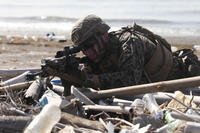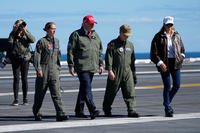Defense Secretary Jim Mattis on Tuesday said the U.S. has seen operations from Russian-affiliated forces in eastern Syria scaled back after U.S. fighter jets fired on hundreds of alleged Russian mercenaries who fought with U.S.-backed forces in early February.
Mattis said the Defense Department has faith in the Russian officers who used the deconfliction line to tell U.S. counterparts the mercenaries were not under their control.
"To this day, I have no evidence that they were being dishonest," he told reporters during an unscheduled briefing at the Pentagon. "We believe that, the Russian officers who tried to deconflict it and told us they weren't their forces, I think they were frankly being honest with us."
The U.S. on Feb. 7 launched significant air and firepower in response to what were believed to be pro-Assad forces attacking U.S.-backed Syrian Defense Forces in Deir el-Zour Province.
Related content:
- US MQ-9 Reaper Drone Takes Out Russian T-72 Tank in Syria
- US to Expel 60 Russian Spies After Nerve Agent Attack in Britain
- US Scrambles Firepower to Defend SDF Against Pro-Assad Forces
The Air Force sent up F-22A Raptor advanced stealth fighters, along with MQ-9 Reaper drones, to watch as a three-hour battle began that day.
"A variety of joint aircraft and ground-based artillery responded in defense of our SDF partners, including F-15E Strike Eagles," Lt. Col. Damien Pickart, Air Force Central Command spokesman, told Military.com at the time.
Just after the strike, officials said they were assessing how many pro-regime forces had been killed, but estimated the number was approximately 100. Other reports suggested that more than 200 were killed, with a number of news outlets saying the militants consisted of Russian mercenaries.
Russia's foreign ministry at the time said some of its citizens died in the battle, but would not confirm they were contractors operating on behalf of the state.
Mattis on Tuesday would not explicitly say the group in question is or has been made up of Russian contracted fighters.
The U.S. has observed "Russian elements like this" in recent weeks moving too close to the deconfliction zone, where the SDF operates to the west of the Euphrates River. Russian forces operate to the east near Deir el-Zour, Mattis said.
Within the last week, "Those elements fell back, so we have also drawn off slightly in order to maintain the deconfliction between the elements there," he said.
"Thanks to the Russian direction on that, this group has been reduced," Mattis said.
Speaking more broadly to the' relationship of the U.S. with Russia, he said the recent expulsion of Russian diplomats across the U.S. and throughout NATO countries reaffirms that brash behavior from Russian President Vladimir Putin will not be tolerated.
"Russia's chosen to be a strategic competitor, even to the point of reckless activity," he said, referring to the nerve agent attack in Britain earlier this month.
"I bring this up because Russia has the potential to be a partner with Europe -- its fortunes are married to Europe. [But] I think that right now that we have to recognize that they've chosen to seek a different relationship with the NATO nations. It is what it is," Mattis said.
He said the incident in Salisbury on March 4 against Russian double agent and now British citizen Sergei Skripal and his daughter, Yulia, was not just an attack on them, but the "potential murder" of many who came in close contact with the nerve agent, known as Novichok.
"The expulsion of numerous Russian diplomats [in NATO] all the way to Australia, Europe, North America, you can see that the nations that have been perhaps slow to leave behind the opportunity for a partnership with Russia are now acting on the actions that Mr. Putin has taken," Mattis said.
-- Oriana Pawlyk can be reached at oriana.pawlyk@military.com. Follow her on Twitter at @Oriana0214.






























